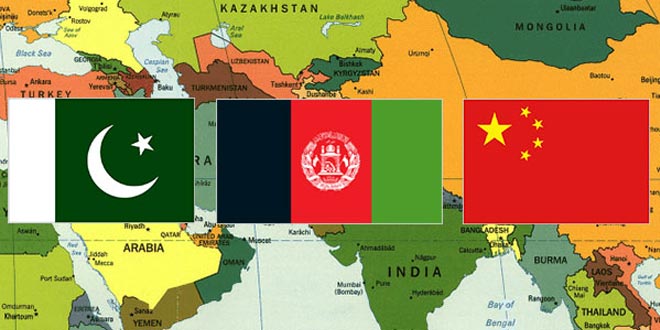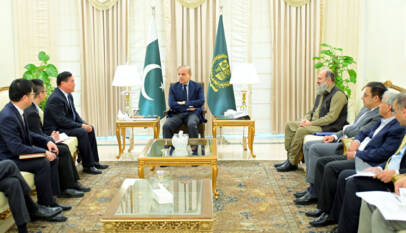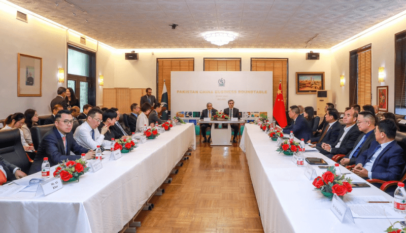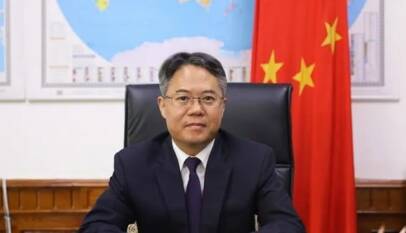BRI to be Extended to Afghanistan Upon Successful Afghan Peace Process
Afghan Peace Process can positively result in the expansion of Belt and Road Initiative. Pakistan-China-Afghanistan peace dialogue will begin in Islamabad on September 7th. Chinese Foreign Minister Wang Yi, Afghan National Security Advisor Hamdullah Mohib, Afghan Foreign Minister Salahuddin Rabbani and Pakistan’s Foreign Minister, Shah Mehmood Qureshi will join the dialogue. In an earlier trilateral meeting, states expressed adherence to strengthening ties, expanding cooperation and promote connectivity under the Belt and Road Initiative, in Regional Economic Cooperation Conference on Afghanistan and other regional economic initiatives.
ISLAMABAD: Pakistan-China-Afghanistan peace dialogue will be held here tomorrow (September 7) to discuss solution to the Afghan issue.
Chinese Foreign Minister Wang Yi, Afghan National Security Advisor Hamdullah Mohib, Afghan Foreign Minister Salahuddin Rabbani and FM Shah Mehmood Qureshi will participate in the meeting.
The three countries will also discuss expansion of China-Pakistan Economic Corridor expansion to Afghanistan, officials said yesterday.
The top diplomats from the three countries will also deliberate on the Afghan peace and reconciliation process and progress thus far made in regards to talks with Taliban.
At a trilateral meeting last year, the foreign ministers of the three countries had reaffirmed their commitment to further strengthening their relations, deepening cooperation and advancing connectivity under the Belt and Road Initiative, Regional Economic Cooperation Conference on Afghanistan and other regional economic initiatives.
A joint declaration issued after the trilateral dialogue in Kabul had said they agreed to promote China-Afghanistan-Pakistan trilateral cooperation under the framework of jointly building the Belt and Road Initiative.
The three sides had reiterated their strong resolve to fight terrorism in all its forms and manifestations, and without any distinction. The foreign ministers had agreed to jointly continue their efforts for building political mutual trust and support reconciliation, development cooperation and connectivity, security cooperation and counter-terrorism as the three areas of the trilateral cooperation.
Pakistan is also working with the United States to ensure peace in Afghanistan. Foreign Minister Qureshi recently said Prime Minister Imran Khan also wanted to meet Afghan Taliban soon leaders to take forward the peace process.
Earlier, Doha-based Afghan Taliban leaders announced that they were ready to visit Islamabad and meet PM Khan if invited.
The statement by the Taliban came after Imran Khan returned to Islamabad following his maiden official visit to the US in July where he discussed the Afghan peace process with US President Donald Trump and agreed to work together to end to the conflict. During the meeting, President Trump said that Pakistan would help the US ‘extricate’ itself from Afghanistan, adding there was ‘tremendous potential’ in the relationship between Washington and Islamabad.
Sohail Shaheen, a spokesperson for the Taliban’s political office in Qatar’s capital Doha, said if Prime Minister Khan extended a formal invitation, they will accept it.
“We frequently visit countries in the region and would surely go to Pakistan, too, which is our Muslim neighbour, if there is a formal invitation from Islamabad,” he said.
The Taliban have been holding peace talks with the US for nearly a year but have refused to meet with the Afghan government, which they view as a puppet regime.
The US Special Representative for Afghanistan Reconciliation, Zalmay Khalilzad, has held a fresh round of backdoor talks with the government leaders and has pressed them to expedite efforts to begin the much-awaited intra-Afghan negotiations.
There are serious disagreements between President Ashraf Ghani and Khalilzad over some items reflected in the draft agreement which according to the US envoy was closed and needed President Donald Trump’s approval to be signed between the two sides.
Khalilzad is insisting for the formation of an authorized and inclusive negotiating team where Ghani will not have the authority to reject the decisions of this peace negotiating team.
However, Ghani is pushing a leadership role for the Afghan government to avoid imprudence in the negotiation process.
Khalilzad, who recently wrapped up the ninth round of talks with the Taliban in Doha, would be in Pakistan any time from Kabul. He said the US and the Taliban had reached an agreement in principle and the document was closed but clarified that it will be finalized when it was approved by President Trump.
The US opposes China’s role in the solution of the Afghanistan issue and has on a number of times asked Pakistan not to rely too much on the regional power.
One official said: “The US basically does not consider China a key party in the Afghanistan issue. They want a US-sponsored solution to the issue.”
China and Pakistan aim for inclusive economic globalization and shared prosperity: Chinese DCM
China is ready to work with Pakistan to implement the important consensus reached by leade…












